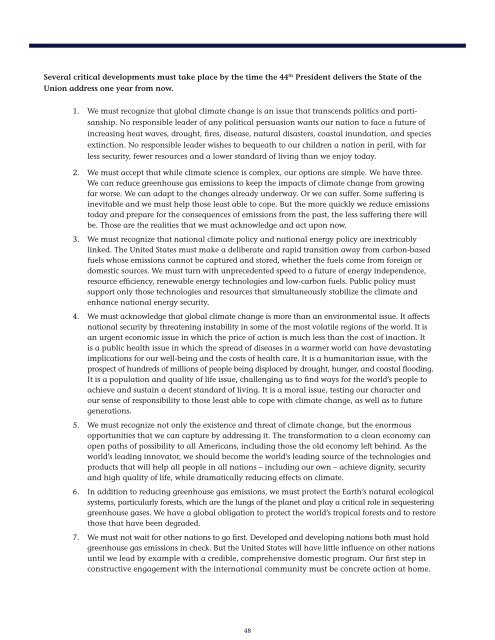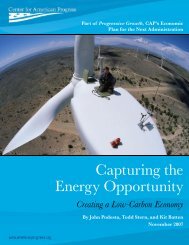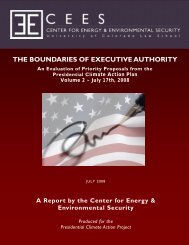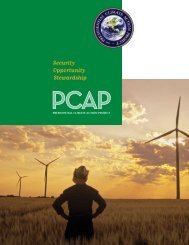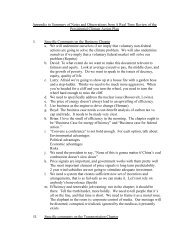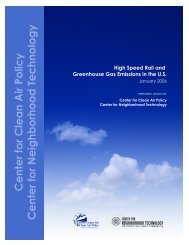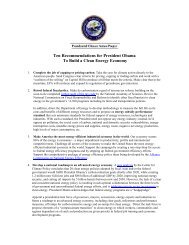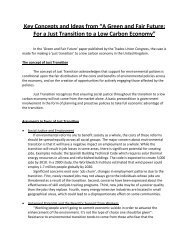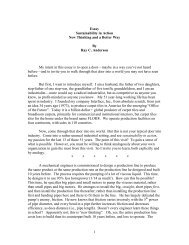The 2011 Plan - Presidential Climate Action Project
The 2011 Plan - Presidential Climate Action Project
The 2011 Plan - Presidential Climate Action Project
You also want an ePaper? Increase the reach of your titles
YUMPU automatically turns print PDFs into web optimized ePapers that Google loves.
Several critical developments must take place by the time the 44 th President delivers the State of theUnion address one year from now.1. We must recognize that global climate change is an issue that transcends politics and partisanship.No responsible leader of any political persuasion wants our nation to face a future ofincreasing heat waves, drought, fires, disease, natural disasters, coastal inundation, and speciesextinction. No responsible leader wishes to bequeath to our children a nation in peril, with farless security, fewer resources and a lower standard of living than we enjoy today.2. We must accept that while climate science is complex, our options are simple. We have three.We can reduce greenhouse gas emissions to keep the impacts of climate change from growingfar worse. We can adapt to the changes already underway. Or we can suffer. Some suffering isinevitable and we must help those least able to cope. But the more quickly we reduce emissionstoday and prepare for the consequences of emissions from the past, the less suffering there willbe. Those are the realities that we must acknowledge and act upon now.3. We must recognize that national climate policy and national energy policy are inextricablylinked. <strong>The</strong> United States must make a deliberate and rapid transition away from carbon-basedfuels whose emissions cannot be captured and stored, whether the fuels come from foreign ordomestic sources. We must turn with unprecedented speed to a future of energy independence,resource efficiency, renewable energy technologies and low-carbon fuels. Public policy mustsupport only those technologies and resources that simultaneously stabilize the climate andenhance national energy security.4. We must acknowledge that global climate change is more than an environmental issue. It affectsnational security by threatening instability in some of the most volatile regions of the world. It isan urgent economic issue in which the price of action is much less than the cost of inaction. Itis a public health issue in which the spread of diseases in a warmer world can have devastatingimplications for our well-being and the costs of health care. It is a humanitarian issue, with theprospect of hundreds of millions of people being displaced by drought, hunger, and coastal flooding.It is a population and quality of life issue, challenging us to find ways for the world’s people toachieve and sustain a decent standard of living. It is a moral issue, testing our character andour sense of responsibility to those least able to cope with climate change, as well as to futuregenerations.5. We must recognize not only the existence and threat of climate change, but the enormousopportunities that we can capture by addressing it. <strong>The</strong> transformation to a clean economy canopen paths of possibility to all Americans, including those the old economy left behind. As theworld’s leading innovator, we should become the world’s leading source of the technologies andproducts that will help all people in all nations – including our own – achieve dignity, securityand high quality of life, while dramatically reducing effects on climate.6. In addition to reducing greenhouse gas emissions, we must protect the Earth’s natural ecologicalsystems, particularly forests, which are the lungs of the planet and play a critical role in sequesteringgreenhouse gases. We have a global obligation to protect the world’s tropical forests and to restorethose that have been degraded.7. We must not wait for other nations to go first. Developed and developing nations both must holdgreenhouse gas emissions in check. But the United States will have little influence on other nationsuntil we lead by example with a credible, comprehensive domestic program. Our first step inconstructive engagement with the international community must be concrete action at home.48


